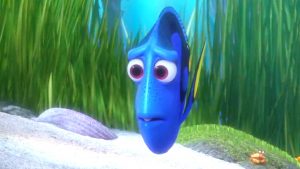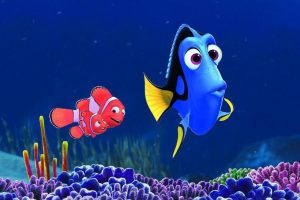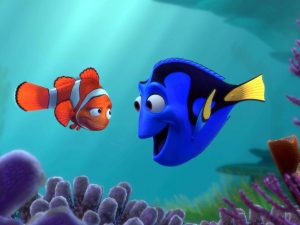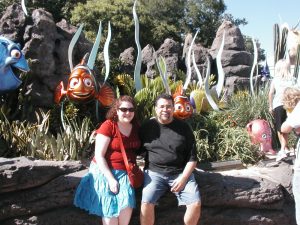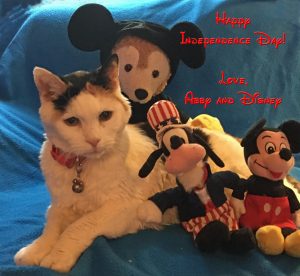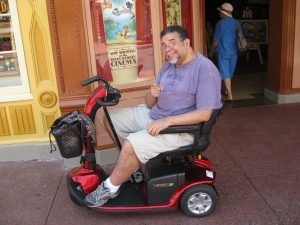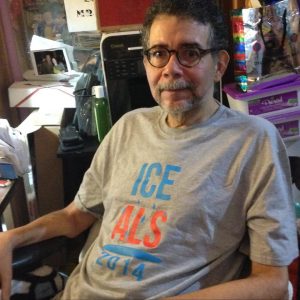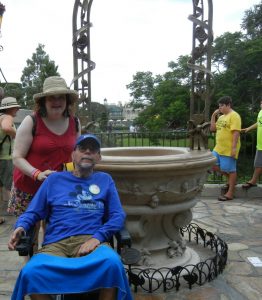Disney’s “Christopher Robin” and Pooh Helped Me Sort Through My Ideas About Grief
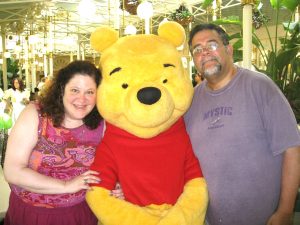
Crystal Pavilion at Walt Disney World, May 2010. We took this trip right after Ben received his ALS diagnosis.
It will come as no surprise to anyone who even vaguely knows me that I was very eagerly awaiting Disney’s Christopher Robin. I love my buddies from the 100 Acre Woods. There are so many wonderful memories of the joy and laughter they brought to Ben and me when we visited Walt Disney World. One of my very favorite memories was seeing Winnie the Pooh at the lunch buffet at the Crystal Pavilion. This was after Ben’s ALS had progressed a bit, and Ben was unable to walk around the buffet or carry his plate, so I got him settled at our table and went to get our lunch. When I returned to the table, Ben told me that I had just missed Pooh, and he said that he told Pooh that I would be so disappointed to have missed him. Ben’s speech was impaired and he hoped that Pooh understood what he said. Sure enough, as I went to take my seat, Pooh came running towards me with outstretched arms and he gave me a big hug. He tapped his head, showing me that he remembered to come back to see me. It was so sweet and Ben was beaming. You see, with ALS, I was always taking care of Ben, and in this situation, he was able to do something very special for me. Pooh would not have known that, and Pooh may say he is a bear of very little brain, but clearly, Pooh has a big heart and a lot of compassion, and in my book that is very smart indeed!
The opening of Christopher Robin seemed so perfectly timed, since I began my blog at this time two years ago, starting with the famous Christopher Robin quote, “You are braver than you believe, stronger than you seem and smarter than you think.” This quote continues to resonate. Christopher Robin was a very wise little boy and Pooh was not such a silly old bear.
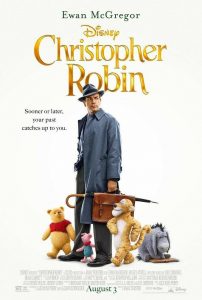
The film was even more wonderful than I had hoped. It is delightful but also thought-provoking and touching. We learn that Christopher Robin may have thought that he grew up and away from the 100 Acre Woods and his imagination, but it was only in tapping the child within him, and his love of Pooh, Tigger, Eeyore and Piglet, that brought Christopher Robin back to what was important in his life. It’s an important lesson that tugged at my heartstrings.
At one point in the film, when Christopher Robin is trying to figure out which way to go, Pooh says “I always get to where I’m going by walking away from where I’ve been.” It was a sweet and silly comment from a sweet and silly bear, but it made me think about where I was three years ago and where I am now. At this time three years ago, Ben was in the hospital deciding if he wanted to go through with getting a feeding tube and tracheostomy. Ultimately, after having those procedures, he made what I consider to be a brave choice to separate from the vent and, ultimately, to succumb to the disease.
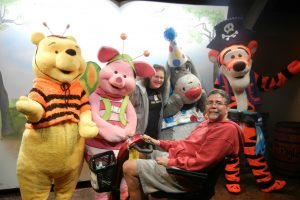
Halloween 2012
After experiencing the profound loss, I was immersed in grief, going through motions in my life but with my feet firmly planted in grief. Kind and caring friends and family wanted me to leave that place, but grief was where I belonged. I could have tried to avoid the pain of grief by walking away from the memories of that overwhelmingly difficult time and landing somewhere- anywhere- else. But, as the movie poster says, “Sooner or later, your past catches up with you.” I don’t believe that I would have been able to ignore the pangs of sadness. Life changed in so many ways and the loneliness and devastation of how much was taken away from Ben and from us was always in my face. But, if I walked away from that part of my life, wasn’t I walking away from my entire relationship with Ben?
Eventually, I reached a point where I wanted to venture forward, but only by dipping my toes in the land of the living. I was floundering, without a sense of where I was going. All I knew was that I wanted Ben to come with me. So, I stepped away from where I was, but Ben was constantly in my thoughts and always vivid in my heart. Sometimes that has been enough and I have kept pace, and sometimes the deeply present feeling of his absence sends me stumbling backwards.
A conversation between Christopher Robin and Pooh sheds light on why I am so bothered by the idea of walking away. In the film, Pooh asks Christopher Robin, “What should happen if you forget about me?” Christopher Robin replies, “Silly old bear. I wouldn’t ever forget about you, Pooh, I promise. Not even when I’m a hundred.” Maybe, for me, walking away implies leaving behind and then, possibly forgetting, and those are things that will never happen for me.
I think about how Ben stays so present in my heart, as do my parents and grandma. Sometimes I feel that people would prefer that I not talk about Ben so much, but, at least for now, it’s what feels right. Maybe the talking about him with such frequency will change, but he and my other loved ones will always be a part of me. It has taken these three years to become more comfortable with the knowledge that continuing to live does not mean that I am walking away and leaving them behind, because they are embedded in my heart and soul, never to be forgotten.
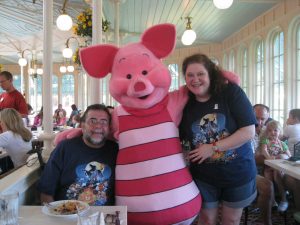
Halloween 2011. Piglet was bigger than we’d imagined!
At this point in time, I may have walked away from the deep grief, and I haven’t exactly worked out where I’m headed, but I carry all of my memories- from the tragic to the beautiful- with me. Do I still give in to tears? Absolutely. Sometimes, when I am having a setback, I return to the grief-filled place. I think it’s okay. Feeling the sadness at times allows me to reflect and to feel that love again. But, I also comfort myself in wondrous, loving and meaningful memories, as well as lots of silly and lighthearted ones. I embrace that our experience with ALS- including caregiving and loss- was a part of our entire sixteen years together and it has contributed to who I am. Writing helps me to check in with myself and reflect on how my emotions have shifted over time.
I highly recommend Disney’s Christopher Robin. It will make you laugh, cry and reflect. And, I’m happy to say that Eeyore steals some scenes with his gloomy but hilarious sarcasm- he’s my favorite, but please don’t tell the others! Also, please be sure to stay for the credits, where you will see a very cute scene featuring the legendary Richard Sherman, who wrote and performed some of the music in the film. It’s fantastic and heartwarming to see him still creating and being a part of the Disney magic.

Halloween 2011. Ben used the scooter but he liked to stand for pictures with our buddies at Walt Disney World.

 Dory felt alone because she thought she would never find her mom and dad and have a family. She finally realized that Nemo and Marlin were also her family. My friends are my family, too and they provided help and support for which I will always be grateful. So did some of the professionals who took care of Ben, and I will forever love and be grateful to them as well. Becky and Gerald may have seemed like they were not up to the task of helping Dory and her friends, but they also came through in big ways. Don’t automatically judge or dismiss people, especially if they genuinely want to help, because they may be the very people who will listen, assist and offer really good ideas and information. Teamwork happens in many ways. All kinds of people stepped in surprised us in wonderful ways throughout Ben’s illness, and they continue to do so. They have compensated for the people who disappointed us, because, of course, there’s that, too. Knowing that Ben was in the hearts of many always touched me, and it still does. Never underestimate the power of compassion and always be open to delightful surprises.
Dory felt alone because she thought she would never find her mom and dad and have a family. She finally realized that Nemo and Marlin were also her family. My friends are my family, too and they provided help and support for which I will always be grateful. So did some of the professionals who took care of Ben, and I will forever love and be grateful to them as well. Becky and Gerald may have seemed like they were not up to the task of helping Dory and her friends, but they also came through in big ways. Don’t automatically judge or dismiss people, especially if they genuinely want to help, because they may be the very people who will listen, assist and offer really good ideas and information. Teamwork happens in many ways. All kinds of people stepped in surprised us in wonderful ways throughout Ben’s illness, and they continue to do so. They have compensated for the people who disappointed us, because, of course, there’s that, too. Knowing that Ben was in the hearts of many always touched me, and it still does. Never underestimate the power of compassion and always be open to delightful surprises.